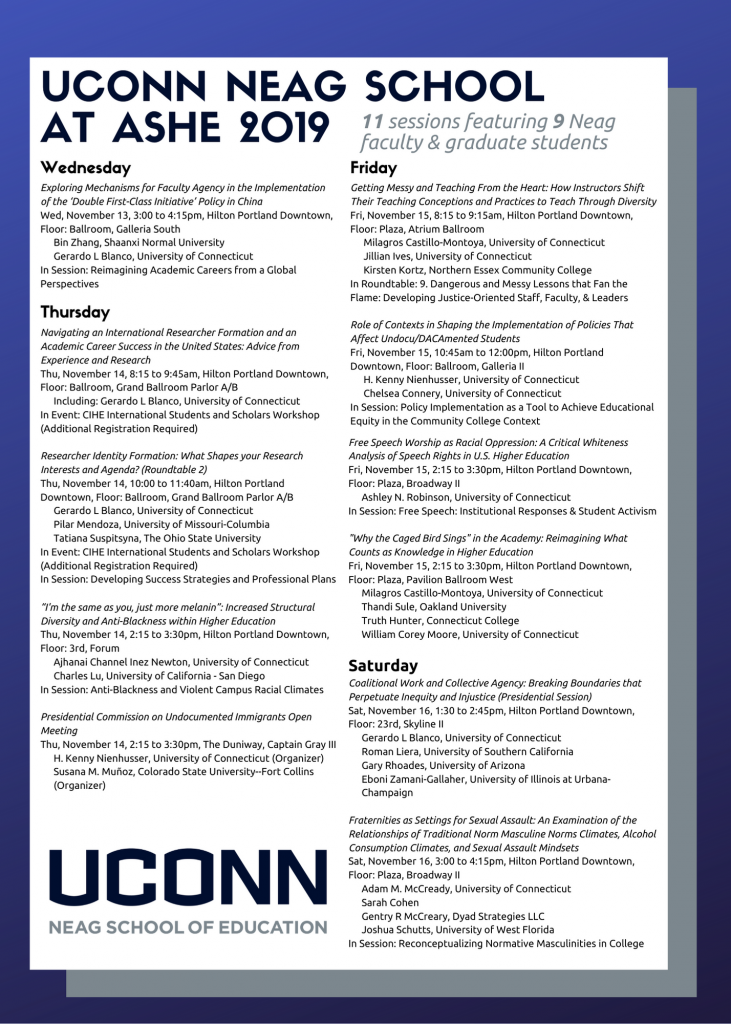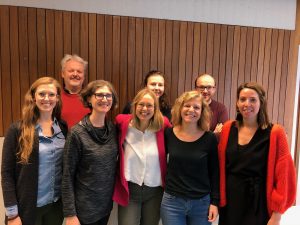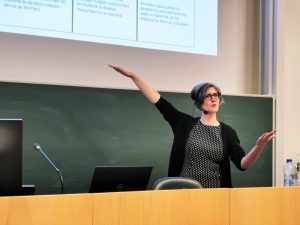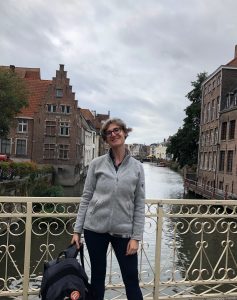UConn EDLR Faculty and Students are headed to Portland for the annual Association for the Study of Higher Education (ASHE) conference being held November 13-16. Below is a list of presentations where EDLR will be representing their research. This information was compiled by Ashley Robinson.
Wednesday
Exploring Mechanisms for Faculty Agency in the Implementation of the ‘Double First-Class Initiative’ Policy in China
Wed, November 13, 3:00 to 4:15pm, Hilton Portland Downtown, Floor: Ballroom, Galleria South
Bin Zhang, Shaanxi Normal University
Gerardo L Blanco, University of Connecticut
In Session: Reimagining Academic Careers from a Global Perspectives
Thursday
Navigating an International Researcher Formation and an Academic Career Success in the United States: Advice from Experience and Research
Thu, November 14, 8:15 to 9:45am, Hilton Portland Downtown, Floor: Ballroom, Grand Ballroom Parlor A/B
Including: Gerardo L Blanco, University of Connecticut
In Event: CIHE International Students and Scholars Workshop (Additional Registration Required)
Researcher Identity Formation: What Shapes your Research Interests and Agenda? (Roundtable 2)
Thu, November 14, 10:00 to 11:40am, Hilton Portland Downtown, Floor: Ballroom, Grand Ballroom Parlor A/B
Gerardo L Blanco, University of Connecticut
Pilar Mendoza, University of Missouri-Columbia
Tatiana Suspitsyna, The Ohio State University
In Event: CIHE International Students and Scholars Workshop (Additional Registration Required)
In Session: Developing Success Strategies and Professional Plans
“I’m the same as you, just more melanin”: Increased Structural Diversity and Anti-Blackness within Higher Education
Thu, November 14, 2:15 to 3:30pm, Hilton Portland Downtown, Floor: 3rd, Forum
Ajhanai Channel Inez Newton, University of Connecticut
Charles Lu, University of California – San Diego
In Session: Anti-Blackness and Violent Campus Racial Climates
Presidential Commission on Undocumented Immigrants Open Meeting
Thu, November 14, 2:15 to 3:30pm, The Duniway, Captain Gray III
H. Kenny Nienhusser, University of Connecticut (Organizer)
Susana M. Muñoz, Colorado State University–Fort Collins (Organizer)
Friday
Getting Messy and Teaching From the Heart: How Instructors Shift Their Teaching Conceptions and Practices to Teach Through Diversity
Fri, November 15, 8:15 to 9:15am, Hilton Portland Downtown, Floor: Plaza, Atrium Ballroom
Milagros Castillo-Montoya, University of Connecticut
Jillian Ives, University of Connecticut
Kirsten Kortz, Northern Essex Community College
In Roundtable: 9. Dangerous and Messy Lessons that Fan the Flame: Developing Justice-Oriented Staff, Faculty, & Leaders
Role of Contexts in Shaping the Implementation of Policies That Affect Undocu/DACAmented Students
Fri, November 15, 10:45am to 12:00pm, Hilton Portland Downtown, Floor: Ballroom, Galleria II
H. Kenny Nienhusser, University of Connecticut
Chelsea Connery, University of Connecticut
In Session: Policy Implementation as a Tool to Achieve Educational Equity in the Community College Context
Free Speech Worship as Racial Oppression: A Critical Whiteness Analysis of Speech Rights in U.S. Higher Education
Ashley N. Robinson, University of Connecticut
Fri, November 15, 2:15 to 3:30pm, Hilton Portland Downtown, Floor: Plaza, Broadway II
In Session: Free Speech: Institutional Responses & Student Activism
“Why the Caged Bird Sings” in the Academy: Reimagining What Counts as Knowledge in Higher Education
Fri, November 15, 2:15 to 3:30pm, Hilton Portland Downtown, Floor: Plaza, Pavilion Ballroom West
Milagros Castillo-Montoya, University of Connecticut
Thandi Sule, Oakland University
Truth Hunter, Connecticut College
William Corey Moore, University of Connecticut
Saturday
Coalitional Work and Collective Agency: Breaking Boundaries that Perpetuate Inequity and Injustice (Presidential Session)
Sat, November 16, 1:30 to 2:45pm, Hilton Portland Downtown, Floor: 23rd, Skyline II
Gerardo L Blanco, University of Connecticut
Roman Liera, University of Southern California
Gary Rhoades, University of Arizona
Eboni Zamani-Gallaher, University of Illinois at Urbana-Champaign
Fraternities as Settings for Sexual Assault: An Examination of the Relationships of Traditional Norm Masculine Norms Climates, Alcohol Consumption Climates, and Sexual Assault Mindsets
Sat, November 16, 3:00 to 4:15pm, Hilton Portland Downtown, Floor: Plaza, Broadway II
Adam M. McCready, University of Connecticut
Sarah Cohen
Gentry R McCreary, Dyad Strategies LLC
Joshua Schutts, University of West Florida
In Session: Reconceptualizing Normative Masculinities in College



